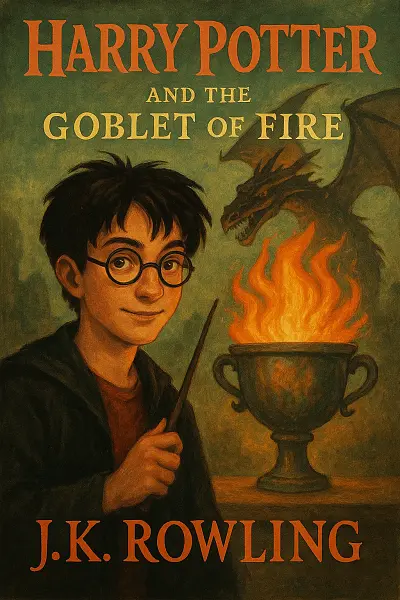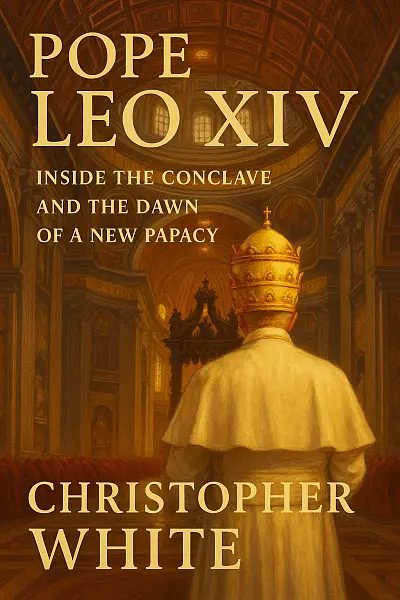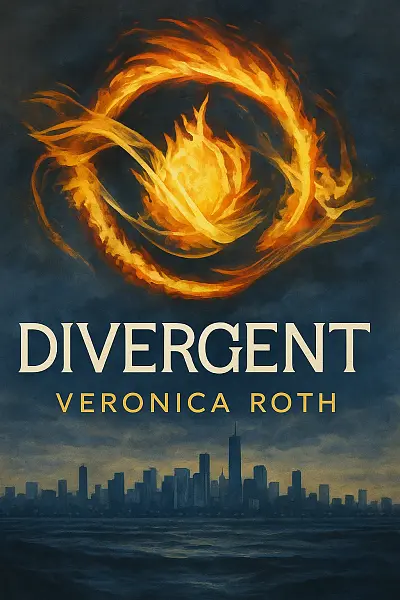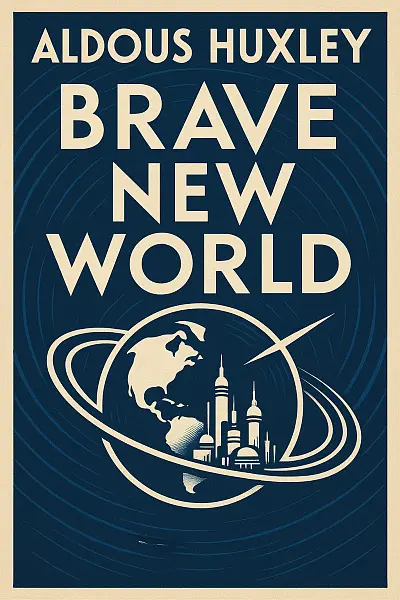
Brave New World
by: Aldous Huxley
Lenina Crowne and Bernard Marx live in the hyper-controlled World State, where everyone’s engineered for happiness—and conformity. Life follows a numbing routine, until Bernard—longing for something real—brings "Savage" John back from a wild, untouched reservation.
John’s raw emotions and yearnings clash with the World State’s shallow pleasures, sparking a crisis that shakes Bernard and Lenina to their cores. As they’re swept up in John’s uproar, they’re forced to face whether comfort is worth the cost of freedom and feeling.
Huxley’s style is sharp, satirical, and at times playfully dark, giving the whole story an edgy, questioning atmosphere.
"“When comfort becomes a cage, freedom fades into a forgotten dream.”"
Let's Break This Down
The Author's Voice
Atmosphere
- Sterile yet unsettling: Huxley paints a clinical world, sparkling with surface efficiency but humming with underlying unease.
- Futuristic chill: Expect a landscape polished by science, where everything is meticulously controlled—making the rare moments of true emotion or rebellion feel shockingly vivid.
- Irony-laced detachment: There’s an ongoing, almost sardonic tone that heightens the sense that something vital is missing in this society.
Prose Style
- Sharp and economical: Huxley’s sentences are crisp, often brisk, and loaded with meaning—he doesn’t linger long, but every word cuts deep.
- Clinical precision meets biting wit: Dialogues buzz with propaganda slogans, repetition, and clever irony, making society’s voice inescapable.
- Descriptive but not lush: He sketches the world with a few efficient strokes—expect clear, focused imagery rather than dreamy lyricism.
Pacing
- Brisk and businesslike: The story moves at a steady clip, diving headlong into this controlled society with barely a pause.
- Quick shifts, little respite: Scene transitions are snappy, mixing exposition, world-building, and plot development almost breathlessly.
- Occasionally disorienting: The momentum can feel relentless—on purpose—mirroring the inability of the characters to escape the system’s grip.
Mood & Rhythm
- Coolly satirical: The mood swings from light mockery to heavy gloom, never letting you get too comfortable.
- Alien yet familiar: All the while, there’s a haunting sense that this imagined future isn’t quite as far-fetched as it should be.
- Underlying tension: There’s a pulse of discomfort woven through the rhythm, making the reading experience both thought-provoking and slightly off-kilter.
Overall Vibe
Looking for a book that feels like a bright clinical light—sharp, scrutinizing, a little surreal? Brave New World delivers with its brisk pacing, ironic voice, and a chilling sense of artifice. Huxley’s style doesn’t coddle the reader, but it will keep you thinking long after you put the book down.
Key Moments
-
"Bottled babies and color-coded castes—welcome to a world where humans are manufactured, not born."
-
Soma holidays: bliss in a pill, numbing the pain of individuality.
-
Lenina's dizzying struggle between programmed pleasure and forbidden desire — it's a clash that's both sexy and sad.
-
"John the Savage crashing London society—awkward, raw, and heartbreakingly human."
-
Hypnopaedic sleep lessons—propaganda disguised as bedtime stories.
-
That haunting scene: the feelies, where cinema gets pumped full of sensation and nobody feels real.
-
A finale that chills: hope and despair entwined on the reservation's edge.
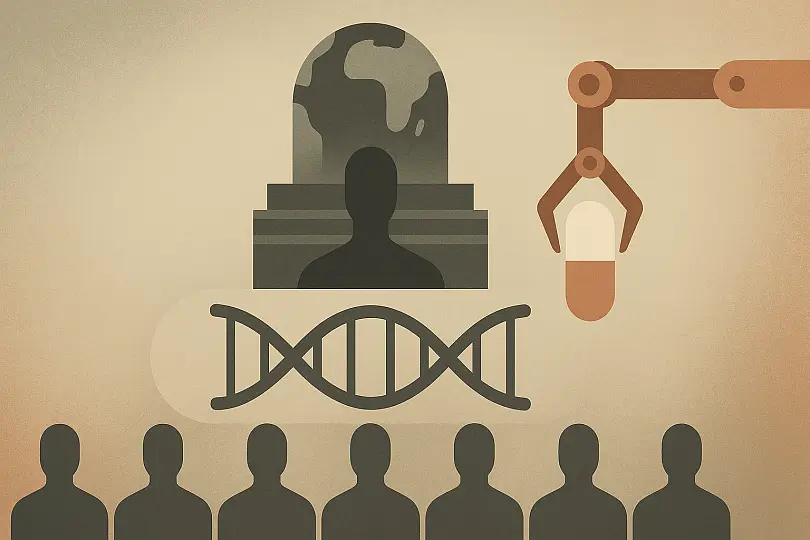
Utopia at any cost—where freedom is the ultimate forbidden desire
What Readers Are Saying
Right for You If
If you’re into dystopian stories with a heavy dose of satire and some big, mind-bending questions, Brave New World will be right up your alley. Seriously, if you love books like 1984 or Fahrenheit 451, this one’s a total must-read—Huxley’s take on the future is wild, weird, and honestly a little chilling.
-
Great for:
Deep thinkers, sci-fi lovers, and anyone who enjoys those “what if society went off the rails?” kind of stories. If you like exploring ideas around technology, conformity, and personal freedom—plus a bit of dark humor—this will totally hook you. -
People who enjoy:
- Unpacking layered themes
- Philosophical debates
- Classic lit with a sci-fi twist
Will probably find themselves completely absorbed here.
But fair warning—if you’re all about fast-paced action, romantic subplots, or super relatable, warm-and-fuzzy characters, this might not be your cup of tea. Huxley’s style can be cold and clinical at times, and some of the old-school language can feel a bit dense. Plot-wise, it’s much more about ideas and world-building than dramatic twists or tear-jerker moments.
Bottom line:
If you love to chew on big themes, question the status quo, and don’t mind a few uncomfortable truths about humanity, this is totally worth picking up. If you prefer lighter reads or character-driven, emotional journeys… maybe try something else first!
What You're Getting Into
Step into a futuristic world where society is engineered for comfort, conformity, and absolute control.
Brave New World throws you into a meticulously crafted utopia where individuality clashes with the unyielding grip of technology and state power. When a curious outsider disrupts this perfect order, everyone is forced to question what true happiness and freedom really mean in a world obsessed with stability.
Seriously, if you love thought-provoking stories with sharp social commentary and unforgettable characters, this one’s got your name all over it!
Characters You'll Meet
-
Bernard Marx: Outsider within the World State, Bernard is intelligent but insecure, struggling with feelings of alienation. His desire for individuality sets him at odds with the conformist society.
-
Lenina Crowne: A popular Beta worker, Lenina craves comfort and stability but is also drawn to deeper connections. Her journey exposes her inner conflict between social conditioning and genuine emotion.
-
John (the Savage): Raised outside the World State, John brings a fresh perspective, challenging the society’s values. His tragic arc embodies the clash between natural humanity and engineered conformity.
-
Mustapha Mond: One of the World Controllers, Mond is a formidable intellect who understands both the old world and the new. He rationalizes the cost of stability, serving as the ultimate spokesperson for the dystopian order.
-
Helmholtz Watson: Creative and restless, Helmholtz is a gifted writer who feels stifled by the system’s restrictions. His friendship with Bernard and John centers on shared dissatisfaction with the superficial society.
More Like This
If you found 1984 by George Orwell gripping, you'll instantly feel the tension in Brave New World’s meticulous society, but where Orwell’s world is haunted by constant surveillance and fear, Huxley tempts (and disturbs) with pleasure, distraction, and engineered happiness—two visions of dystopia that make you question the direction of modern life. Fans of The Giver by Lois Lowry will recognize a similar suppression of individuality and emotion, yet Huxley’s version dials up the satire and bleak humor, painting a world that’s both bizarrely alluring and deeply unsettling, prompting readers to ponder what we’re willing to trade for so-called peace.
For those who love visual storytelling, Brave New World echoes elements of the critically acclaimed TV series Black Mirror, especially in its exploration of technology’s power to manipulate desires and identity. The pervasive sense that something essential has been quietly lost connects these works, making each encounter with Huxley’s world feel both eerily plausible and subtly chilling.
Critic's Corner
What is the price of engineered happiness if it means the death of freedom? Brave New World hurls this searing question at its readers with a force that still feels shocking today. Aldous Huxley drags us straight into a future so meticulously ordered—and so eerily plausible—that its comforts become more chilling than any dystopian nightmare. This isn’t just a prophecy; it’s an uncomfortable mirror for anyone alive in a world enthralled by technology, convenience, and the constant hum of mediated pleasure.
Huxley’s prose mixes satirical bite with eerie lyricism. His writing is, at times, coolly detached, and bracingly vivid the next—a blend that perfectly captures a society that has traded intimacy for efficiency. Dialogue races with a kind of unsettling rhythm, echoing synthetic mantras (“everyone belongs to everyone else”) that lodge in the reader’s brain. Tone-wise, he veers between clinical irony and bursts of bleak beauty, especially in descriptions of the “savage” world beyond the controlled utopia. Narrative technique relies on shifting perspectives, crystalline description, and deft, economical world-building: Huxley gives sensory texture to cloned masses as effectively as to the one-off pains of an outsider. The language is sometimes dense with allusion, demanding close attention, but those who persevere are richly rewarded with flashes of wit and flashes of horror.
The book’s thematic core is astonishingly prescient: mass entertainment as social control, pharmaceutical bliss as spiritual emptiness, engineered equality as a mask for deep dehumanization. Brave New World skewers the cult of progress that promises a frictionless, sanitized existence—while quietly draining away all depth and dignity. Huxley’s vision aches with the question: Is pleasure without meaning really worth having? Even nearly a century later, his warning about the seduction of “happiness” through technology, drugs, and collective conformity feels more timely than ever.
The philosophical dilemmas—security vs. liberty, happiness vs. authenticity, the individual vs. the group—resonate deeply against both postwar authoritarianism and the current age of algorithm-driven distraction. From ethical bioengineering to propaganda’s subtle grip, Huxley’s anxieties remain our own. The novel’s refusal to offer tidy answers, confronting us instead with uneasy ambiguity, is perhaps its greatest act of bravery.
As dystopian literature, Brave New World stands alongside Orwell’s 1984, but its focus on pleasure instead of repression makes its horror all the more insidious. Huxley is less interested in the boot stamping on a human face, and more in humanity willingly trading its soul for a shallow peace. Within Huxley’s own works, it towers as his most focused, biting, and unforgettable creation—a high-water mark for speculative fiction as social critique.
If the book falters, it’s in character depth: some figures feel more like mouthpieces than real people, and the narrative’s cool intellect sometimes distances rather than engages the reader emotionally. Yet the scope, ambition, and chilling clarity of Huxley’s vision dwarf those shortcomings.
Final verdict: Brave New World matters now more than ever—a dazzling, disquieting masterpiece that dares you to question what we lose in our rush to remake ourselves. If you crave fiction that unsettles, provokes, and leaves you wrestling with its questions long after, this is essential reading.
Community Thoughts
Not going to lie, the scene with Lenina and the soma hits way too close to home. The desperate need for numbness, the relentless search for comfort in a controlled world, it made me question my own routines.
i still see Mustapha Mond in my dreams, his calm logic quietly terrifying. every time he spoke, i felt a weird chill, like he knew something I didn't and it messed with my head for days.
I CAN'T STOP THINKING ABOUT LENINA. She’s this whirlwind of confusion and control, and somehow her choices made me question my own. Huxley, what did you do to my brain?
bernard marx just lingers in my mind, awkward and desperate to belong. his unease is infectious and I kept thinking about how out of place he was, even in his own head.
I CAN’T STOP THINKING ABOUT LENINA. Her programmed happiness feels so real yet so empty that I kept questioning my own habits. She haunted me for days after finishing.
Leave Your Review
Local Take
Why It Matters
Brave New World stirs up all kinds of feelings for readers here! The whole idea of sacrificing individuality for stability could seriously hit home, especially when you think about:
- Historical echoes: Parallels pop up with intense moments in our own history—think about the push for conformity during politically turbulent years, or tech booms shaping daily life.
- Cultural values: Our culture prizes community and harmony, but also personal freedom. So the story’s dystopia feels uncomfortably familiar—people might see echoes in the pressure to “fit in” or not make waves.
- Plot points that pack a punch: The way characters numb themselves to pain and avoid tough emotions might feel very real here, where appearances can matter a little too much.
- Literary vibes: Brave New World definitely challenges local storytelling, which often leans into hope and resilience over bleak endings. Its sharp satire and cynicism can be a jolt compared to more optimistic homegrown stories.
Reading Huxley’s vision is like holding up a funhouse mirror—distorted, but weirdly recognizable. It sparks big debates about what we’re willing to trade for “happiness” and who gets to decide what happiness really means.
Food for Thought
Controversies:
- Brave New World has sparked debate and faced frequent bans for its portrayal of sexuality, drug use, and anti-religious themes.
- Critics and educators have often argued whether the novel's dark depiction of a controlled, hedonistic society serves as insightful social commentary or promotes offensive, subversive ideas.
Like what you see? Share it with other readers



